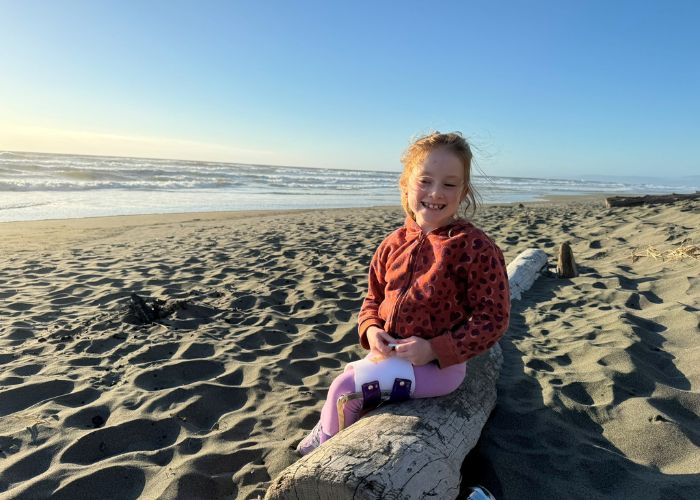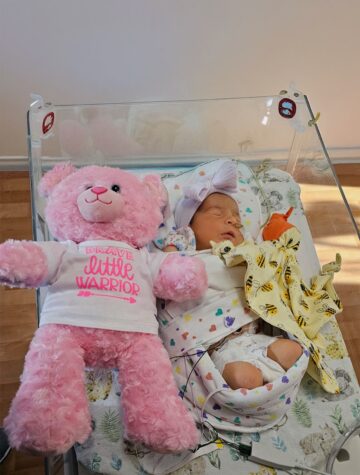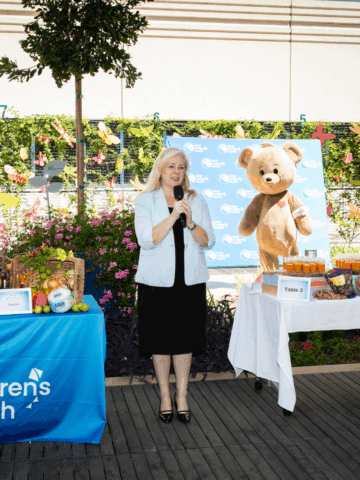The first clue that Bethany Owens would be a precocious child came when she was just hours old.
Born with spina bifida and undergoing surgery 12 hours after birth to repair an opening along several vertebrae in her mid- to lower back, Bethany spent 10 days in CHOC neonatal intensive care unit (NICU) when she apparently decided that enough was enough.
Bethany, all 6 pounds of her, set off a cascade of beeps and other alarms when she started yanking off her feeding and breathing tubes and IV lines.
“We joke that she checked herself out of the NICU,” recalls her mother, Ashley, referring to her husband and Bethany’s father, Jerry.
Says Bethany, now 7, with a giggle: “I wasn’t supposed to do it, but I didn’t know any better.
“I tricked everyone.”
Gaining independence
These days, having lived with a condition that can cause serious disabilities, Bethany has no sensation from her knees down, but she’s learning to walk using her thigh muscles and aided by foot braces.
She’s a chatty, happy kid who has endeared herself to her care team at CHOC.
And now, following surgery last year at CHOC’s Colorectal and Urogenital Center, she’s relishing a greater sense of independence with improved urinary and bowel control.
Bethany is looking forward to being in the second grade this fall, loves playing the piano, and enjoys being a member of the Girl Scout Daisies.
“She can light up a room with her big beautiful blue eyes and her engaging personality,” says CHOC pediatric surgeon Dr. Donald Shaul, a leading expert in treating rare colorectal disorders who runs the Colorectal and Urogenital Program.
“She and her family are such a joy to treat.”

Feeling more at ease
Spina bifida is a condition that occurs when the spine and spinal cord don’t form properly in a developing embryo.
Bethany had the most serious type of this neural tube defect called myelomeningocele, which leaves openings along several vertebrae, exposing tissues and nerves. This type of spina bifida may cause loss of movement in the legs and bladder and bowel dysfunction.
Ashley, at 16 weeks pregnant, got the call.
“It was terrible news,” she recalls.
Ashley and Jerry were referred to CHOC pediatric neurosurgeon Dr. Michael Muhonen.
Dr. Muhonen briefed them on the surgery that would be needed immediately after birth and arranged for a tour of the NICU as well as meetings with Bethany’s multi-disciplinary care team.
“He really helped us feel more at ease with everything,” Ashley says.
So did the couple’s strong faith.
Ashley had a scheduled C-section but Bethany, true to form, couldn’t wait.
She came early at 37 weeks – on Dr. Muhonen’s birthday.
“He calls her his baby,” Ashley says about the happy coincidence.
Tough decisions
Although necessary to prevent infection and further injury to Bethany’s spinal cord and nerves, the surgery to repair her birth defects of the spine and spinal membranes couldn’t completely repair lost function – which is typical for a spina bifida diagnosis.
Prior to the surgery, Ashley and Jerry had tough decisions to make.
They decided against surgery in utero and, also, passed on an amniocentesis for Ashley, a prenatal test to analyze a sample of amniotic fluid to detect genetic or chromosomal disorders.
At 3 weeks of age, Bethany began seeing CHOC urologist Dr. Elias Wehbi for follow-up care because she couldn’t empty her bladder or bowels normally.
They also followed up with Dr. Muhonen, who has treated Bethany for hydrocephalus, Chiari malformation, and chronic motor and sensory dysfunction.
Two recent procedures
Last fall, Ashley and Jerry were ready to move ahead with surgery to improve Bethany’s bladder and bowel management.
Dr. Wehbi and Dr. Shaul, working together in true multidisciplinary fashion, performed the procedures.
The first was a Mitrofanoff, which involved using Bethany’s appendix as a channel between the skin surface and the urinary tract, thus allowing her to empty her bladder via a catheter on a timed schedule.
Bethany also needed an opening to catheterize her bowel so that it could be flushed out, avoiding the need for standard enemas. To do this, the surgeons used a flap of her large intestine rolled into a tube.
This created a second appendix “neoappendicostomy” that was sutured inside the bottom of her belly button. Bethany now can empty her bowels by passing a small tube into her belly button and flushing out the waste.
Bethany was in the hospital a week after the September 2023 surgeries and had catheters and tubes in her for four months.
Once the new channels healed, she was tube free, able to swim, and enjoy family trips with less stress.
Back to CHOC
In addition to her bowel and urinary tract-related surgeries, Bethany had outpatient surgery to correct a lazy eye and another procedure, when she was 5, to untwist her left leg.
A couple of months after her surgery last fall, she fell ill for unknown reasons and was rushed to CHOC. She ended up in the pediatric intensive care unit (PICU) for treatment for sepsis as well as an intestinal infection.
She was discharged two days before Christmas.
“All of this has been really stressful, and I’ve just been making it through every single stressful thing,” Bethany says.
CHOC’s therapy dogs have made an enormous difference, Bethany and her mother say.
“She has a superpower,” Ashley says. “All of the therapy dogs love to take naps with her.”
Active girl
Bethany loves math.
“I know what 1,000 plus 1,000 is – 2,000!” she proudly declares.
Then she blurts out:
“Look, I can stand on one leg!”
Back at home, Bethany continues to improve her skills as a piano player.
“She can play ‘Take Me Out to the Ballgame,’” Ashley says.
“That’s too easy-peasy, mom,” Bethany replies.
This summer, Bethany and her family, which includes little sister Jamie, visited the redwoods in Northern California and southern Oregon.
She wants to be an astronaut nurse.
“I hear space is pretty cool,” Bethany says.
Get more expert health advice delivered to your inbox monthly by subscribing to the KidsHealth newsletter here.
Learn more about the CHOC’s Colorectal and Urogenital Center
The CHOC Colorectal and Urogenital Center specializes in providing expert diagnosis and second opinions for colorectal disorders, as well as developing personalized treatment plans using advanced diagnostics and the latest research-based treatment options.





